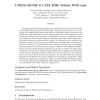82 search results - page 13 / 17 » Using Relevant Domains Resource for Word Sense Disambiguatio... |
TSD
2007
Springer
14 years 1 months ago
2007
Springer
The world wide web is a natural setting for cross-lingual information retrieval. The European Union is a typical example of a multilingual scenario, where multiple users have to de...
BMCBI
2005
13 years 7 months ago
2005
Background: The ability to distinguish between genes and proteins is essential for understanding biological text. Support Vector Machines (SVMs) have been proven to be very effici...
CLEF
2009
Springer
13 years 8 months ago
2009
Springer
This paper presents the participation of the semantic N-levels search engine SENSE at the CLEF 2009 Ad Hoc Robust-WSD Task. During the participation at the same task of CLEF 2008,...
IEAAIE
2011
Springer
12 years 11 months ago
2011
Springer
Domain specific terminologies represent important concepts when students study a subject. If the sentences which describe important concepts related to a terminology can be accesse...
SAC
2009
ACM
14 years 2 months ago
2009
ACM
Incorporating background knowledge into data mining algorithms is an important but challenging problem. Current approaches in semi-supervised learning require explicit knowledge p...

